International
Maduro and Petro meet for the fourth time in just a few months
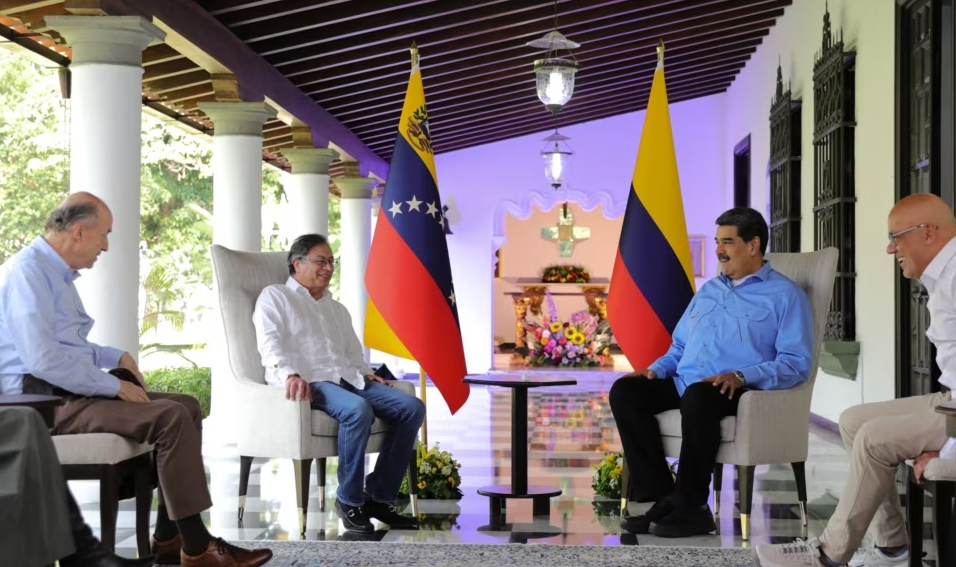
March 24 |
The presidents of Venezuela and Colombia, Nicolás Maduro and Gustavo Petro, met on Thursday in Caracas where they addressed issues of economic, commercial, financial, political and cultural cooperation, according to official sources.
“Productive and warm working meeting with the President of the Republic of Colombia, Gustavo Petro. We set out to deepen the alliances between Venezuela and Colombia, and we are achieving it with union and commitment. Always welcome to this sister land!”, Maduro simply wrote on his Twitter account on Thursday night.
Shortly after, through the official account of the Presidency of Colombia, it was reported that the leaders discussed issues related to the “joint fight against drug trafficking, the opening of consulates and the Summit of countries of the region to be held within the framework of the Amazon Cooperation Treaty Organization (ACTO)”.
The meeting, in which several high-ranking officials participated, among them the Colombian Foreign Minister, Alvaro Leyva; the president of the Venezuelan National Assembly, Jorge Rodriguez; the Colombian ambassador in Venezuela, Armando Benedetti, took place at the Aquiles Nazoa Cultural House, former presidential residence, and ended without a public statement.
Petro’s visit was scheduled for Monday, but was cancelled amid a corruption scandal in the state-owned oil industry, Petroleos de Venezuela (PDVSA), for which several high-ranking public officials have been arrested.
Following the reestablishment of diplomatic relations in August last year, after Petro took office, the leaders have already held three bilateral meetings in Caracas and one at the Atanasio Girardot International Bridge, which links the state of Táchira with the Department of Norte de Santander.
On that occasion, in February of this year, they signed a partial scope agreement of a commercial nature and Petro said he hoped that the bridges “will be filled with trade” and “people” on both sides of the border.
Consulted by Voice of America, Juan Francisco Contreras, internationalist and president of the College of Internationalists of Venezuela (CODEIV), exposes that the absence of details of the agenda generates “many speculations” and considers that one of the topics that has caused Petro’s frequent visits to Caracas are the peace negotiations of his government with the National Liberation Army (ELN).
For the internationalist with studies in security and defense, both Venezuela and Colombia are interested in the demobilization of the groups that are “outside the law on both sides of the border”.
However, he considers that there is a “rush” on the part of Petro to achieve results and believes that the priority should focus on establishing “objectives and guidelines” so that the process “does not end badly” as in the case of the Revolutionary Armed Forces of Colombia (FARC).
In his opinion, Colombia is also interested in a democratic solution to the Venezuelan political crisis, which, he believes, would allow the return of many Venezuelans in the neighboring country.
Contreras does not see, so far, that there has been a real “normalization” in trade relations.
“The way in which the economic policy has been designed in our country has affected Venezuelan businessmen, there is practically no credit, the transportation issue is very complicated, there are many situations that make our businessmen to be in difficult conditions to be able to compete with other businessmen. Changes must be made so that our businessmen can be competitive”, he explains.
In 2015, after a diplomatic crisis with the Colombian government, Maduro ordered to close the passage of vehicles on the border with Colombia and in 2018 the Venezuelan government expelled consular officials.
Relations between Maduro and former President Iván Duque, who recognized Juan Guaidó as interim president of Venezuela, were marked by constant mutual accusations, especially since 2019 when humanitarian aid was attempted to enter through the border.
International
Javier Milei vows to work ‘side by side’ with the U.S. on trade rules
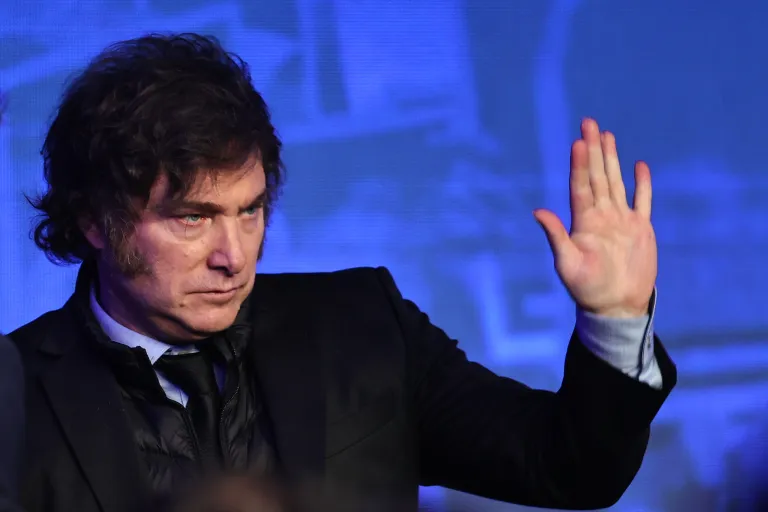
Determined to work “side by side” with the United States, Argentine President Javier Milei announced in Mar-a-Lagothat his government will modify trade regulations to meet the requirements of Donald Trump’s newly imposed tariffs.
Milei arrived in Florida amid the trade war triggered by the latest round of tariff hikes announced by the Republican leader. While many countries are considering retaliation, Milei’s ultraliberal Argentina has opted to adapt instead.
“Argentina will move forward in adjusting its regulations to comply with the reciprocal tariff proposal drafted by President Trump,” Milei stated at the Gala of American Patriots, organized by the Make America Clean Again (MACA) Foundation and the We Fund the Blue NGO, according to his office.
He further explained that Argentina has already met nine out of the 16 necessary requirements and has instructed his administration to comply with the remaining ones in order to resolve trade asymmetries with the U.S. in a short time frame.
International
Paraguay summons Brazilian ambassador over Itaipú espionage scandal
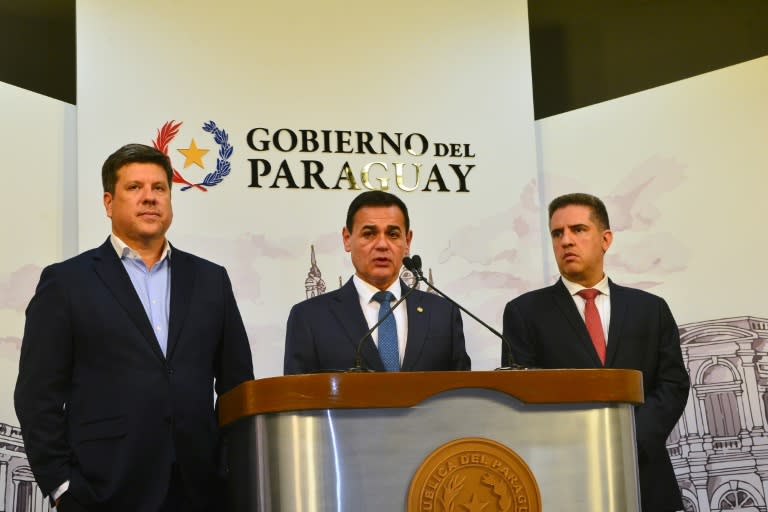
Paraguay summoned the Brazilian ambassador in Asunción on Tuesday to demand “explanations” and called its own representative in Brasília for consultations following Brazil’s acknowledgment of an espionage operation. The Brazilian government, led by President Luiz Inácio Lula da Silva, attributed the operation to the previous administration.
The surveillance effort aimed to uncover Paraguay’s position in now-suspended negotiations with Brazil regarding the pricing of electricity from the binational Itaipú hydroelectric plant, according to reports in the Brazilian press.
The Brazilian government “categorically denied any involvement in the intelligence operation,” stating in a Foreign Ministry communiqué on Monday that the espionage was carried out under former President Jair Bolsonaro’s administration (2019-2023).
“The operation was authorized by the previous government in June 2022 and was annulled by the interim director of the (state intelligence agency) ABIN on March 27, 2023, as soon as the current administration became aware of it,” Brazil’s government asserted.
Paraguay’s Foreign Minister Rubén Ramírez announced that Brazilian Ambassador José Antonio Marcondes de Carvalho was summoned “to provide detailed explanations” regarding the operation. Additionally, Paraguay recalled its diplomatic representative in Brasília “to report on aspects related to the intelligence activity conducted by Brazil regarding Paraguay’s government affairs.”
International
Elon Musk to step down as government advisor, per Trump insiders
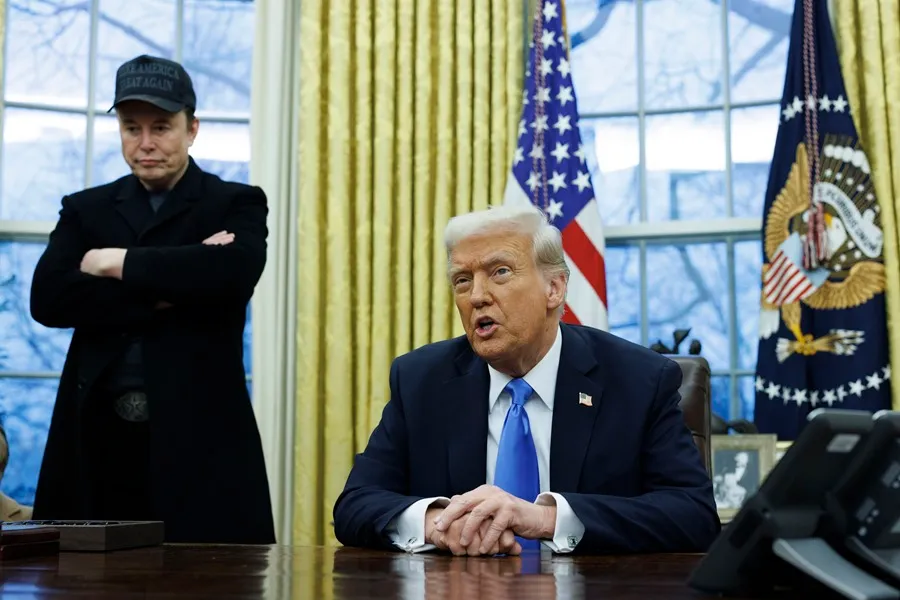
President Donald Trump has informed his inner circle that Elon Musk will be stepping down from his role as a government advisor, according to a report by Politico today.
Citing three individuals close to Trump, Politico states that the president is pleased with Musk’s leadership at the Department of Government Efficiency (DOGE), where he has implemented significant budget cuts. However, both have agreed that it is time for Musk to return to his businesses and support Trump from a different position outside the government.
A senior administration official told Politico that Musk will likely maintain an informal advisory role and continue to be an occasional visitor to the White House. Another source warned that anyone thinking Musk will completely disappear from Trump’s circle is “deluding themselves.”
According to the sources, this transition is expected to coincide with the end of Musk’s tenure as a “special government employee,” a temporary status that exempts him from certain ethics and conflict-of-interest regulations. This 130-day period is set to expire in late May or early June.
-

 Central America5 days ago
Central America5 days agoU.S. Homeland Security Secretary urges Mexico to strengthen Guatemala border
-

 International3 days ago
International3 days agoParaguay summons Brazilian ambassador over Itaipú espionage scandal
-

 Central America5 days ago
Central America5 days agoPanama grants Martinelli 72-hour extension to travel to Nicaragua
-

 Sports3 days ago
Sports3 days agoFilipe Luis debuts as coach in Copa Libertadores with Flamengo
-

 International5 days ago
International5 days agoTrump urges Putin to reach peace deal
-

 Central America3 days ago
Central America3 days agoGuatemalan police officer killed in mob riots over baby kidnapping
-

 International3 days ago
International3 days agoElon Musk to step down as government advisor, per Trump insiders
-

 Sports3 days ago
Sports3 days agoVenezuela investigates 18 baseball players seeking asylum in Spain
-

 International3 days ago
International3 days agoÓscar Arias: Trump’s trade policies are a step backward
-

 Central America1 day ago
Central America1 day agoPanama’s former president Martinelli claims political enemies tried to kill him
-

 International3 days ago
International3 days agoMilei vows to make Argentina so strong that Falkland Islanders “choose” to join
-

 International3 days ago
International3 days agoICE agent’s arrest of suspect sparks controversy in Boston
-
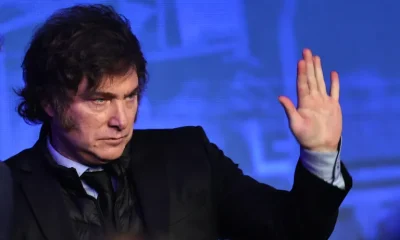
 International1 day ago
International1 day agoJavier Milei vows to work ‘side by side’ with the U.S. on trade rules















